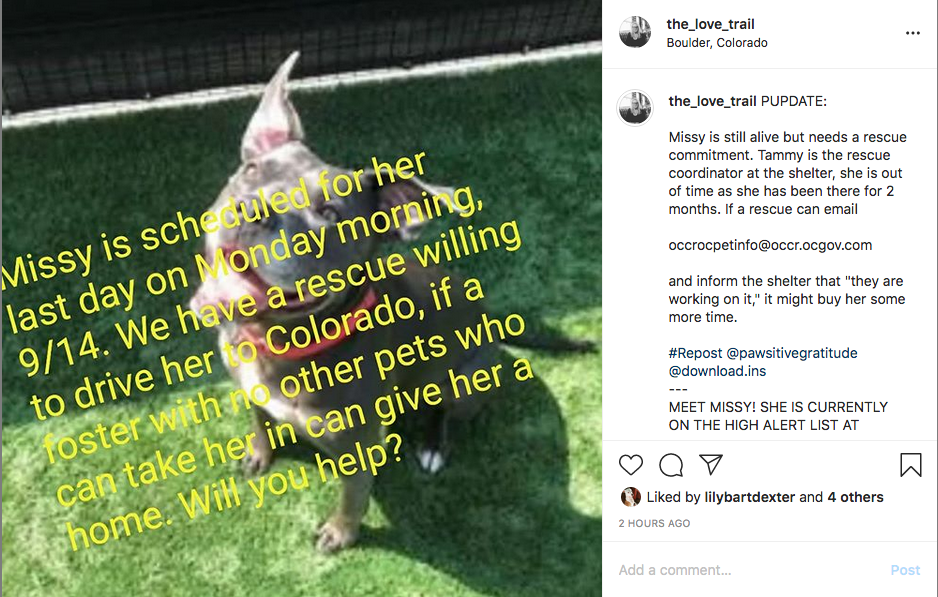
We are all interconnected.
It’s not just a platitude. What you do right now, affects me tomorrow. What you fail to do tomorrow, affects me today.
As I write this, on a 70-degree sunshiny afternoon here in the Colorado Rockies, another dog’s life hangs in the balance. Why? She has been labeled by her captors as food aggressive, reactive, and unfriendly with other dogs. She must, as those who would end her life come Monday morning will have it, go to a home with no other pets.
What she needs, obviously, is training and reorientation to a world more civilized and acquainted with coexistence. (Don’t we all?)
Did she decide her fate, or did they?
The answer to the question is as simple as it is rhetorical: it’s a matter of liability.
I am not here to vilify shelters, nor those carrying out their lethal policies, for I presume that they did not create them. Rather simply, they are following the chain of command, carrying out the fatal duties of those signing their paychecks.
I have condemnation for the policies of shelters, which continue to pour their economic, temporal, physical, and energetic resources into disposing of healthy dogs as if though they were old lamps.
Shelter reform is desperately needed. Not tomorrow, but today.
If you need any proof that we humans affect one another, look at the statistics for the rise in anxiety medication over the past several years, and especially the past few months. The need for sleep aids, the increase in insomnia, the drastic proliferation of suicide. Americans are suffering more and more daily, and our individual actions toward each other are having a detrimental effect.
We have rapidly become a less compassionate society than perhaps the one we grew up in—and, I would argue, there are those among us advocating for more compassion and expanded consciousness than ever before.
Back to the issue at hand. Missy, as this seven-year-old mutt is named by her people, awaits her fate in a California shelter. Once loved upon by those to whom she was born, she is unaware that tomorrow the good people coming into the shelter for the usual Monday morning work will be ending her life. She will have no idea why and will wonder who has failed her, what she did wrong to suddenly fall asleep into some oblivion where the light may shine into some form of eternity meant for those not destined to remain on this earth.
And the people—the countless, intelligent, connected, and talented people, the trainers and the behaviorists, the advocates and the networkers, the fosters and the rescues, even the shelter workers themselves—will suffer one more harm by way of a wrong decision by an ill-fated and short-sided policy that is in dire need of change. They will, as do I, suffer the harm of grief, helplessness, loss, disappointment, frustration, disempowerment, disenfranchisement, and even the systemic racism tied up with pit bull breeds that were once loved upon by those watching “Spanky & Our Gang.”
They will suffer the hope for humanity and preoccupation of mind because they will know they used all of their best efforts and heartfelt resources to save her. They will feel they have failed, because they are caught up in a system that feels inextricably bound up with politics and economics, stubborn indifference and casual disregard; and they will hold Missy in their hearts—hearts that will ache, wishing for a different outcome. They will feel as disappointed in their fellow humans come Monday morning as Missy will feel in the loss of her precious, could-be-longer-if-only, innocent, and fragile canine life.
They will be forced to reconcile that they cannot save them all, as goes the familiar hashtag, because they have been intensely, overwhelmingly, desperately, trying to save the dogs before Missy, training and devoting their love as best they know how.
Change starts with just one dog. We must say no to ending the lives of healthy, loving animals today, and support the No Kill movement for a more compassionate culture.
Here are a few other things you can do, locally and nationally, to support and raise consciousness for saving more dogs:
1. Spay and neuter your own dog to prevent overpopulation. Have doubts? Consult your veterinarian. (Squeamish young guy? Just remember, your dog’s gonads are not your own, a single dog’s gestation cycle is 62 days, and the average litter of puppies is between 4-6. Euthanasia rates are still, despite improvements, in the millions.)
2. Train and socialize your dog. Far too many of the homeless dogs winding up in shelters have special restrictions, like Missy. A dog is for life, but unforeseen circumstances create situations where dogs wind up in shelters and lacking in basic training and socialization. Shelters are far quicker to rid themselves of such liability, and potential adopters will keep walking toward the trained and socialized dogs.
3. Foster, donate, or sponsor a foster-based rescue. Rescues nationwide need more fosters, without which they cannot pull dogs out of harm’s way.
4. Support funding for shelters—money for training and behaviorists—to help better the dog’s chances of finding a home. A trained and well-behaved dog has a much better chance of adoption than an unruly, wild (and yet, fun!) one.
5. Good at social media? Get on board with the Rescue Dog Advocacy Movement—follow The Love Trail on Instagram, and we’ll incorporate you into our fractured world of impassioned, empowered dog-lovers working hard each day to save the lives of all we encounter.
Namaste, and thank you for reading.
~


 Share on bsky
Share on bsky




Read 5 comments and reply